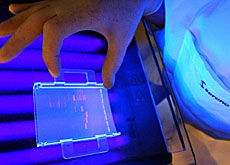Europe seeks to relax curbs on drug prices

European Union health ministers have been meeting in Rome to discuss a wide range of reforms affecting the pharmaceutical industry and the cost of drugs.
Switzerland – a non-EU member but a key player on the European pharmaceutical scene – is taking a keen interest in the debate.
Novartis, Roche and Serono are members of the European Federation of Pharmaceutical Industries (EFPIA) and Interpharma, the organization of Swiss pharmaceutical research companies, is attending the meeting.
Delegates are considering whether drug companies can offer their products at whatever price they want – a move with far-reaching implications.
At the moment, many EU countries ban the sale of drugs until the government fixes a price. This is usually much lower than in the United States.
Experts say it is one of the reasons why Europe’s pharmaceutical industry is losing ground to the US.
“For almost ten years, the European authorities have discussed the declining competitiveness of the industry in Europe but from an industry perspective we haven’t seen much in the form of action,” Thomas Cueni, general secretary of Interpharma, told swissinfo.
Long delays
Related issues on the agenda include the need to get faster access to new medicines and the need to speed up market approval and reimbursement decisions in member states.
“It would make the European scene and the European pharmaceutical companies much more competitive,” said Daniel Vasella, chairman and chief executive of Novartis. “We would see market forces at work which are not at work today.”
On average, European patients have to wait almost two years longer than their American counterparts until they have access to new, innovative medicines.
In Switzerland, which escapes Europe’s lengthy decision-making process, patients normally get faster access.
Cueni said there was a discrepancy and tension between the free flow of goods in the single European market and the fact that 15 member states (soon to be 25) had control over their own healthcare systems.
“You have national pricing and reimbursement controls with a very damaging impact on the industry,” he told swissinfo.
The fragmentation of the EU pharmaceutical market results in a lucrative parallel trade where importers buy in cheap countries and resell in more expensive ones.
Parallel trade was estimated to amount to €4.5 billion in 2002. It benefits neither social security nor patients but deprives the industry of additional resources to fund R&D.
It is also generally recognised that the US has a climate which favours and rewards innovation whether through stronger patent protection or premium prices for new drugs.
“Europe has very much focused on cost containment,” said Cueni. “The notion of how do you promote innovation and how do you facilitate access to innovation has taken second or even third priority and we really hope that this will change.”
Losing ground
Although Europe’s pharmaceutical industry performs well, various indicators suggest that it is losing its competitive edge.
Between 1990 and 2002, research and development investment in the US rose more than fivefold, while in Europe it only grew 2.5 times, according to IMS Health, a research group.
The US accounts for more than 70 per cent of the sales of new medicines since 1998 compared with only 18 per cent in Europe.
More than 191,000 Americans work in the drug industry, compared with 87,000 Europeans.
The EU set up the G-10 Medicines group two years ago bringing together governments, drug companies and health-industry professionals to tackle these issues.
“Europe has really lost out in this area over the last 10-15 years because it was so much focused on cost and prices,” said Cueni. “By and large growth is driven by innovation and pharmaceuticals are an extremely important part of that.”
“When you look at the Swiss economy you can see the importance of innovation and investment in research and development of new drugs for economic growth.”
swissinfo, Vincent Landon
The world pharmaceutical market was worth an estimated €432,467 million in 2002
The North American market (USA and Canada) grew fastest and remained the world’s largest market with a 50.9 per cent share, well ahead of Europe and Japan.
Between 1990 and 2002, research and development investment in the US rose more than fivefold, while in Europe it only grew 2.5 times.
The US accounts for more than 70 per cent of the sales of new medicines since 1998 compared with only 18 per cent in Europe.
More than 191,000 Americans work in the drug industry, compared with 87,000 Europeans.

In compliance with the JTI standards
More: SWI swissinfo.ch certified by the Journalism Trust Initiative











You can find an overview of ongoing debates with our journalists here . Please join us!
If you want to start a conversation about a topic raised in this article or want to report factual errors, email us at english@swissinfo.ch.